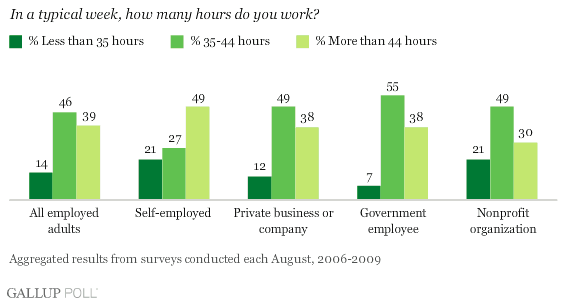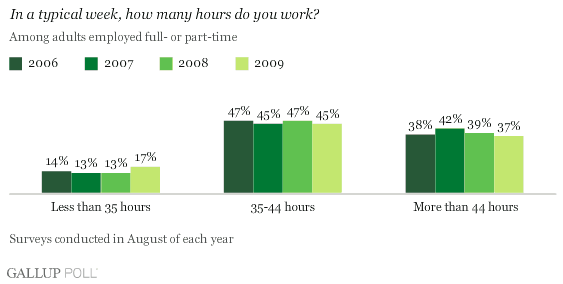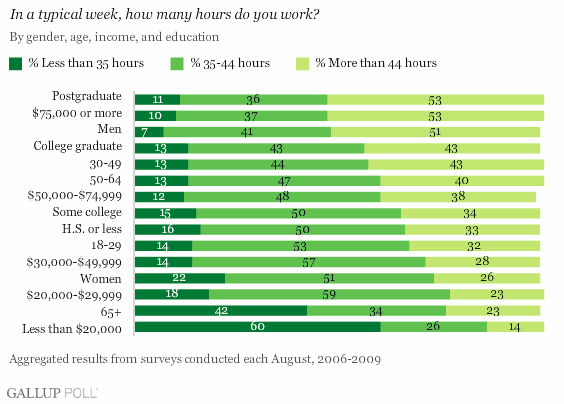WASHINGTON, D.C. -- Nearly half of self-employed Americans (49%) report working more than 44 hours in a typical work week, compared to 39% of American workers overall, 38% in government and in private business, and 30% in nonprofit organizations. More than half of government workers (55%) work a traditional 35- to 44-hour work week, making them the most likely to do so.

Nonprofit and self-employed workers (21% of each group) are equally likely to say they work less than 35 hours per week, likely reflecting part-time work. However, a sizable percentage of self-employed workers -- 26% -- say they work at least 60 hours per week, a much larger percentage than is found for workers of any other sector.
The findings are from aggregated results of 2006-2009 ���۴�ýWork and Education surveys, which each August ask Americans how many hours they work in a typical work week.
Despite the current recession and resulting job losses, ���۴�ýdoes not find any measurable change over the past few years in the number of hours Americans say they typically work. Essentially unchanged from 2006, 2007, and 2008, 45% of American full- and part-time workers this year said they typically work 35 to 44 hours, 25% said they work between 45 and 59 hours, 12% said they work 60 or more hours, and 17% said they work less than 35 hours per week.

In addition to the results by job description, the aggregated analysis of the overall results across several years provides a large sample with which to more closely examine the results by demographic group. Workers with postgraduate education, those making at least $75,000 per year, and men are those most likely to work more than 44 hours per week. Those aged 65 and older, and those making less than $20,000 per year are the most likely to work less than 35 hours -- again likely reflecting part-time work. Most other segments tend to skew toward the traditional work week.

Bottom Line
Despite the recession and higher unemployment, the American worker is clocking about the same number of hours as have been the standard for the past several years. Self-employed Americans stand out as those most likely to work atypically long hours, in many cases upwards of 60 hours per week. Government employees stand out as those most likely to work a typical 35- to 44-hour work week. By demographic group, it is clear that more education is related to more work hours, but, at the same time, that more work hours are related to more income.
Survey Methods
Results from the most recent survey are based on telephone interviews with 528 employed adults, aged 18 and older, conducted Aug. 6-9, 2009. For results based on the total sample of national adults, one can say with 95% confidence that the maximum margin of sampling error is ±5 percentage points.
Aggregated results combine surveys conducted in Aug. 7-10, 2006; Aug. 13-16, 2007; Aug. 7-10, 2008; and Aug. 6-9, 2009. For results based on the aggregated sample of 2,163 employed adults, one can say with 95% confidence that the maximum margin of sampling error is ±3 percentage points.
Interviews are conducted with respondents on land-line telephones (for respondents with a land-line telephone) and cellular phones (for respondents who are cell-phone only).
In addition to sampling error, question wording and practical difficulties in conducting surveys can introduce error or bias into the findings of public opinion polls.
